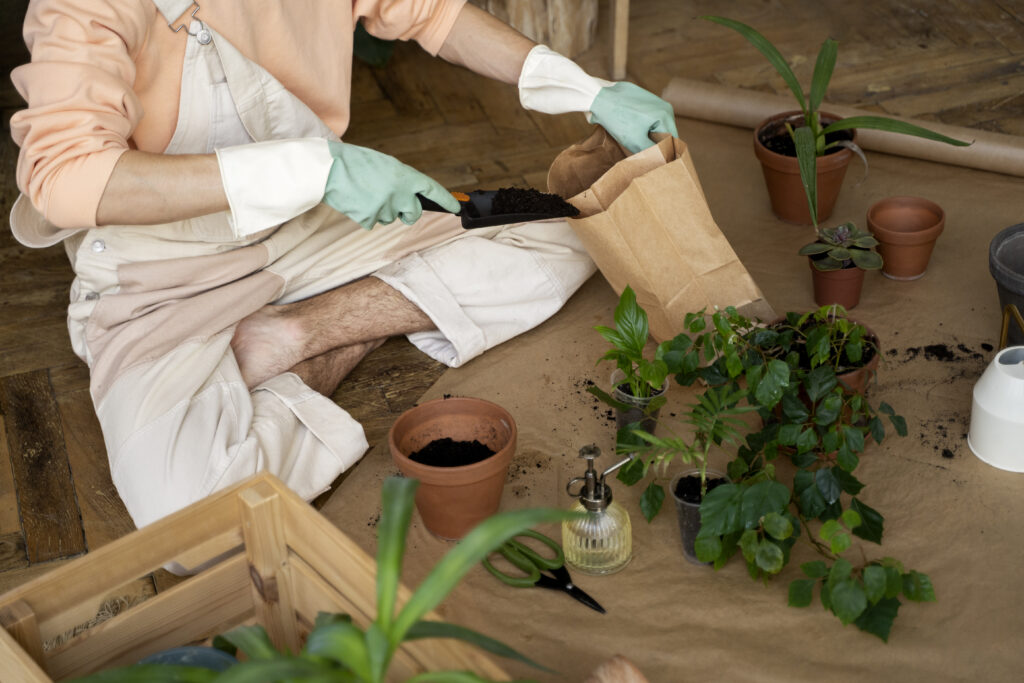In today’s fast-paced world, mental health challenges like anxiety, stress, and depression are increasingly common. While therapies and medications are important for mental health, gardening is a natural and easy way to improve your well-being. It is also a low-cost option that anyone can access. Let’s explore the mental health benefits of gardening, supported by academic research and relevant to the Indian context.
Gardening Helps to Alleviate Stress and Anxiety
A study in The Journal of Health Psychology indicates that gardening can notably lower cortisol levels (a hormone associated with stress). Participants reported feeling more relaxed after gardening and other calming activities such as reading.
Reasons for its Effectiveness
Connection to nature: It allows you to experience greenery, having a calming effect on the mind. Many Indian homes have limited access to large green spaces. However, small terrace or balcony gardens can also provide a calming effect.
Physical activity: Activities like digging, planting, and watering provide light exercise leading to the release of endorphins, which are the body’s natural stress relievers.
Example: During the COVID-19 lockdown, many people in urban India started gardening to manage stress. Simple activities like cultivating mint (Pudina) or coriander (Dhania) in pots became a therapeutic way to escape the uncertainty of being indoors.
Gardening Improves Mood and Alleviates Depression
It offers a feeling of achievement and purpose, which can help combat feelings of despair commonly linked to depression. Research published in the Journal of Psychiatric Research indicated that horticultural therapy (the use of gardening as a form of treatment) resulted in notable enhancements in mood for individuals dealing with clinical depression.
Reasons it is Effective
Sunlight Exposure: Spending time outside, increases exposure to natural sunlight. This, in turn, elevates Vitamin D levels, which are crucial for mood regulation.
Growth and Progress: Growing and observing the plants creates a feeling of achievement and optimism. Nurturing a living being enhances feelings of responsibility and self-worth.
Illustration: In rural India, women who garden in the kitchen frequently experience greater contentment and diminished feelings of isolation. Growing vegetables for the family boosts their mental well-being and also promotes a sense of independence.
Gardening Fosters Mindfulness
Mindfulness is the practice of being present in the moment, and growing plants naturally supports this practice. Taking care of plants requires close attention: observing the soil, feeling the texture of the leaves, and noticing the subtle changes as they grow.
Why it is effective
Sensory involvement: It helps you connect with nature. You can see the green plants, smell the rich soil and flowers, touch the leaves and petals, and hear the rustling of the leaves. These activities can calm your anxious mind.
Stepping away from digital distractions: Gardening helps you take a break from screens and enjoy quiet moments in nature.
Example: In cities like Bangalore and Mumbai, gardening workshops are becoming more popular. People say that planting seeds and taking care of plants helps them feel calm and focused. This activity helps them deal with the stress of city life.
Gardening Encourages Social Connections
Joining a gardening community or swapping plants with neighbours can help reduce loneliness, which is a major problem for mental health. Research in the American Journal of Public Health shows that gardening can build a sense of community and improve social well-being.
Reasons it is effective
Collective experiences: Talking about gardening techniques, sharing harvests, or collaborating on gardening projects strengthens relationships.
Alleviating loneliness: Interacting with other gardeners regularly helps create a community. This is important for older adults or homemakers who might feel lonely.
Example: In Kerala, the government encouraged families to grow vegetable gardens. Many communities began sharing seeds and gardening tips. This helped them make friends and feel less lonely.
Gardening Enhances Mental Function
Gardening helps keep your mind active by encouraging problem-solving and learning new things. This can reduce cognitive decline as we age. A study in the Journal of Aging Research shows that gardening lowers the risk of dementia by 36%.
Reasons for its effectiveness
Planning and arranging: Choosing what to plant, where to place it, and how to care for various species stimulates mental activity.
Acquiring new knowledge: Learning to compost and propagate plants helps you think better and grow your knowledge.
Illustration: School gardening clubs are becoming more common in India. These clubs help students learn about sustainability. Taking care of plants helps students think critically and manage resources better.
Gardening Provides a Sense of Control
In a world filled with chaos, gardening gives us a grounding experience and empowers us with a sense of control over our environment. This process provides comfort and a sense of routine.
The reason it works
Personal agency: Watching something thrive as a result of your efforts reinforces the idea that your actions are meaningful.
Routine and responsibility: Doing regular tasks like watering, pruning, and weeding helps bring order to daily life. This can be especially helpful for people who feel anxious.
Example: For Indian homemakers who juggle many responsibilities, taking care of a small garden can be calming. Many find comfort in growing Tulsi (holy basil), a plant that holds spiritual meaning and helps them feel more purposeful.
How to Begin Gardening for Mental Wellness in India
Start with Easy Plants: Think about growing herbs like mint, coriander, or basil. These herbs are easy to care for and do well in small spaces.
Choose Organic Methods: Use simple and natural methods to help the environment. Compost your food scraps and apply neem oil to control pests.
Become Part of a Community: Many cities have gardening groups. In these groups, members share plants, seeds, and gardening tips.
Pace Yourself: Enjoy gardening without worrying too much about the results. Focus on the experience, as the journey is what matters most.
CONCLUDING THOUGHTS
Gardening is not just a hobby, it also enhances mental health. Gardening in India can help lower stress from everyday life. It doesn’t matter if you live in a big rural area or a small city apartment, gardening can be beneficial for you. It helps you reconnect with nature, engage your senses, and feel a sense of achievement, all of which can boost your mood. Why not take a pot, plant some seeds, and allow nature to enhance your mind and spirit?



Pingback: Outdoor Gardening Hacks You Need to Know - Organic Kokan